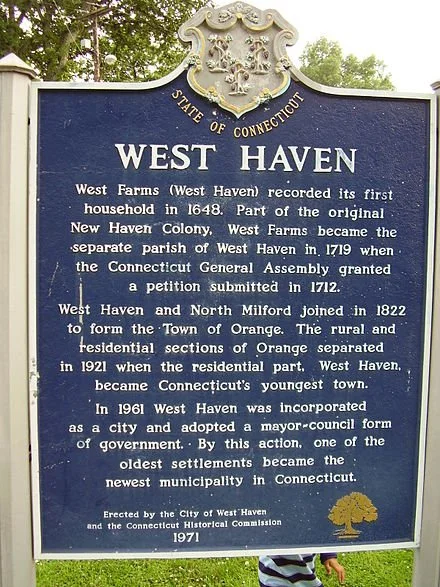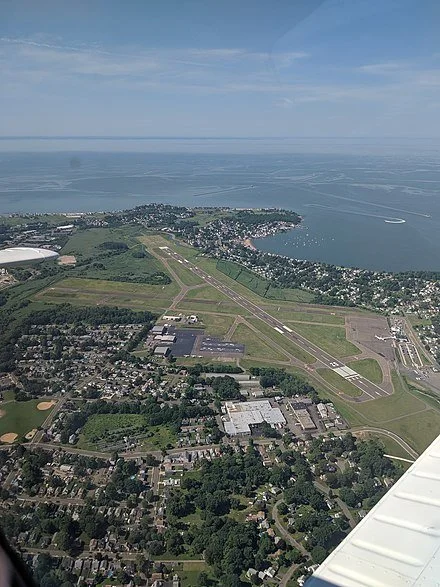
Chris Powell: Out-of-state marching band plays dirge for Connecticut
Ocean Avenue in West Haven
MANCHESTER, Conn.
West Haven may be providing the perfect metaphor for government and politics in Connecticut.
The small city has been suffering from financial excess so long that since 2017 it has been operating under the supervision of the state's Municipal Accountability Review Board. Because of a federal criminal indictment announced a few weeks ago, the city discovered that it had been looted of $636,000 of its emergency federal epidemic assistance money, allegedly embezzled by its state representative, who had been double-dipping as a salaried assistant to the City Council.
Nevertheless, Mayor Nancy Rossi's defense against the scandal right under her nose -- her obliviousness -- was accepted by the voters, who narrowly re-elected her Nov. 2.
Then enterprising journalism by the Connecticut Mirror found that apart from being embezzled, some of West Haven's emergency federal money was also spent to hire a marching band for the city's Memorial Day parade, to buy Christmas decorations, and to buy services from a City Council member's company. The New Haven Register already had reported that some of the federal money was spent to pay town officials for "compensatory time."
While the state accountability board had placed an agent at City Hall, he missed the fraud as well. So maybe the board needs to be investigated as much as city government does.
In another state such a scandal might prompt the legislature to hold hearings to investigate. But Connecticut's state legislators have left the corruption issue to federal prosecutors, just as the state's own prosecutors have.
Nevertheless, an estimated $4 billion more in federal money will be sent to Connecticut for highway and bridge improvements under the "infrastructure" legislation recently approved by Congress. Connecticut Rep. Rosa L. DeLauro, chairwoman of the House Appropriations Committee, says the money is all about "jobs, jobs, jobs."
But thousands of jobs, including many highly paid jobs in manufacturing, are already open in the state and can't be filled. Indeed, that marching band for the West Haven parade had to be imported from New York.
At least the federal infrastructure money may demolish the long-running argument for reimposing tolls on Connecticut highways. The money also may demolish the argument for joining what is called the Transportation Climate Initiative, an increase in the wholesale tax on gasoline in the name of raising money for less-polluting modes of transportation.
And if, as many members of Congress hope, their next spending bill includes a national program of paid family and medical leave, Connecticut will be able to repeal its own recently enacted program, for which the state income tax was raised by a half percent.
Federal money is considered better than state money because it can be created without taxation and thus can seem free -- as long as people don't start wondering why their fast-food hamburger and fries now cost more than $10 and gasoline more than $3 per gallon.
Whatever happens, government in Connecticut already has far more emergency federal money than it knows what to do with. That's why some has been spent on a marching band.
Tweed New Haven Airport
Gov. Ned Lamont and other dignitaries gathered Nov. 3 to celebrate the revival of Tweed New Haven Airport, which is the new East Coast hub for startup Avelo Airlines. There are great plans for Tweed -- lengthening its runway to handle larger jetliners and construction of a terminal accommodating more traffic.
But Avelo is not what Connecticut really needs at Tweed. For the airline plans only flights to six cities in Florida, to which thousands of state residents relocate in the winter, often for tax purposes, the Sunshine State not taxing personal income.
Instead of more ways of sending people to Florida, Tweed and the New Haven area need flights to hub airports, such as the American Airlines flights to Philadelphia and Charlotte that Tweed had until the virus epidemic devastated the travel industry.
If Tweed could recover those flights and gain flights to Chicago or Dallas, the airport would put New Haven on the national map for business development. Suddenly more people might have reason to come to Connecticut than to leave it.
Chris Powell is a columnist for the Journal Inquirer, in Manchester.
Chris Powell: Running empty trains won't increase production; some people seem to be enjoying their pandemic lockdowns
— Photo by Chianti
MANCHESTER, Conn.
While Connecticut Gov. Ned Lamont remarked the other day that state government doesn't have enough money to rescue every business suffering from COVID-19 pandemic, most people think that the federal government has infinite money and can and should make everyone whole.
Sharing that view, Connecticut U.S. Sen. Richard Blumenthal this week went to the railroad station in West Haven to join Catherine Rinaldi, president of the Metropolitan Transit Authority, in calling for an emergency $12 billion federal appropriation for the MTA, which runs the Metro-North commuter railroad line from New Haven to New York City. Metro-North has lost 80 percent of its passengers and fares because of business curtailments and the shift to working from home.
There are two problems with the appeal from Blumenthal and Rinaldi.
First, there is no need to keep Metro-North operating on a normal schedule when most passengers are missing. Except for railroad employees, no one is served by running empty trains.
Indeed, curtailment of commuter-rail service might make time to renovate the tracks and other facilities. Rather than furloughing railroad employees, hundreds of them might be reassigned temporarily to collect the trash that litters the tracks between New Haven and New York. The savings on electric power from running fewer trains still would be huge.
The second problem is that the federal government's power of money creation is infinite only technically. While nothing in law forbids the federal government from spending any amount, money is no good by itself. It has value only insofar as it has purchasing power -- only insofar as there are things to be purchased, only insofar as there is production and with so many people out of work or working less during the epidemic, production has fallen measurably. Operating empty trains won't increase production, but spending $12 billion to operate them may worsen the devaluation of the dollar, whose international value recently has fallen substantially amid so much money creation.
So it might be far better to add that $12 billion to public-health purposes.
The $12 billion desired by the MTA is only a tiny part of the largess imagined by the incoming national administration and many members of Congress who will be returning to Washington next month. They are contemplating another trillion dollars in bailouts, and that's just for starters. Such is the damage done to the national economy by the epidemic and government's often clumsy responses to it.
“Scene in club lounge,’’ by Thomas Rowlandson (1757-1827)
Amid all the seemingly free money, some people are starting to enjoy lockdowns or at least finding them tolerable, especially those who, like many government employees, get paid as usual whether they work or not.
This week two Hartford City Council members, Wildaliz Bermudez and Josh Mitchtom, called on the governor to use the state's $3 billion emergency reserve to pay everybody to stay home for a month and to stop most commercial operations in the name of slowing the spread of the virus. Bermudez and Mitchtom seemed unaware that the emergency reserve is already expected to be consumed by the huge deficits pending in next year's state budget. The reserve won't come close to covering all the shortfalls.
But then getting paid for doing or accomplishing nothing is a way of life in Hartford, encouraged by state government's steady subsidy of so many failures in the city.
Last week a group of 35 doctors went almost as far as those Hartford council members, urging the governor to close gyms and restaurants and to prohibit all “unnecessary” gatherings so as to stop the virus and prevent medical personnel from being overwhelmed. It didn't seem to bother the doctors that those businesses and their employees already have been overwhelmed by commerce-curtailment orders, suffering enormous losses, including business capital and life savings. The doctors are inconvenienced now and may be more so but they won't be losing their life savings and livelihoods.
The governor is trying to strike a balance among all these interests. Every day presents him with another difficult judgment call that upsets someone. He may be realizing that Connecticut is just going to have to tough it out and accept some casualties all around.
Chris Powell is a columnist for the Journal Inquirer, in Manchester.




